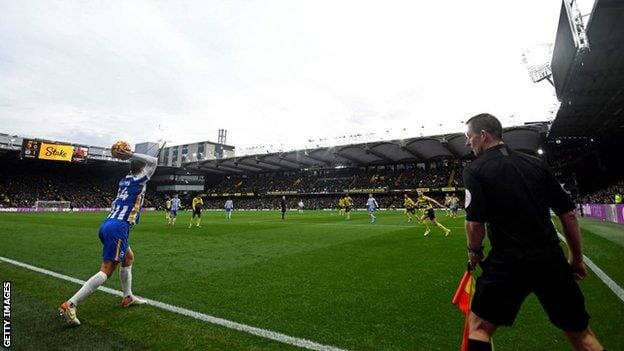

The possible introduction of kick-ins has been discussed at the latest meeting of football’s lawmaking body.
The International Football Association Board (Ifab) held its annual general meeting in Doha on Monday.
And while the body said there were talks over kick-ins, there were no plans to trial them yet.
Former Arsenal manager Arsene Wenger, head of global development for world governing body Fifa, included the idea among several new proposals last year.
Throw-ins have been used in football since the 1860s, when the Football Association removed the kick-in option in 1863.
Speaking last year, Wenger said throw-ins and free-kicks were the “two big time-wasters at the moment”.
He added: “The target is to make the game more spectacular and quicker, and maybe with throw-ins you could play with your feet, in a limit of five seconds for example.
“But it has to be tested and then has to be accepted by the Ifab.”
Meanwhile, semi-automated video assistant referee (VAR) technology could be ready in time for the Qatar World Cup.
Fifa president Gianni Infantino said a decision would be taken before the tournament begins in November, however Pierluigi Collina, chairman of the governing body’s referees committee, added: “I’m confident it can go ahead.”
The technology, which uses automated ball detection to enable offsides to be highlighted within seconds, will continue to be trialled.
The use of five substitutes has now been introduced into the laws of the game.
However, the trial of additional permanent concussion substitutes has been extended until August 2023 – despite calls by campaigners for temporary concussion substitutions to be introduced.

Ifab initially approved a trial which only allowed for permanent concussion substitutions in December 2020 – despite the Professional Footballers’ Association calling for temporary substitutions to be included as part of the testing.
The rule allows for a permanent substitution to be made if a player suffers a head injury – regardless of the number of replacements a team has already used.
Although temporary substitutions were reconsidered, Ifab said: “Members agreed that the trials should continue to focus on permanently removing any player with actual or possible concussion to ensure this player does not continue taking part.
“It was agreed that further education is needed to ensure the trial protocols are applied correctly.”
Prior to Ifab’s latest decision, campaigner Dawn Astle, daughter of former England and West Brom striker Jeff Astle – who died in 2002 of a brain condition linked to heading footballs – said “players are being put at risk” by current rules.
Measures including body cameras worn by referees could also be trialled in an attempt to to improve the safety of officials in adult grassroots football.
Research last year suggested more than 90% of grassroots referees have experienced abuse, leading to fears the treatment of officials at grassroots level could cause many to leave the sport for good.
The Football Association proposed a discussion on a body camera pilot to Ifab earlier this year following calls from referees and local league administrators.
The use of five substitutes was initially introduced during May 2020 following the Covid-19 pandemic.
The Premier League was the only major competition not to continue with the rule for the 2020-21 season, but top-flight clubs agreed to return to five substitutions from the start of the 2022-23 campaign.
It has also been decided the number of named substitutes in matchday squads should increase from 12 to 15, at the discretion of the competition organiser.







